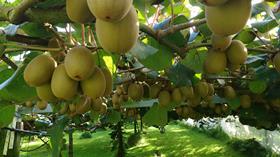
New Zealand’s Ministry of Social Development’s (MSD) has declared a seasonal labour shortage in the country’s primary kiwifruit growing region.
The declaration, announced today (7 May), applies to the Bay of Plenty area for the period 7 May - 8 June (2018).
Under the terms of the declaration, overseas visitors already holding visitor visas will be able to apply to vary the conditions of their visas, allowing them to work in the kiwifruit industry.
With half of this season’s kiwifruit crop still to be picked, it is hoped the move will help fill an estimated 1,200 vacancies over the rest of the main harvest period.
Between January and April 2018, MSD has placed 1,032 job seekers into the kiwifruit industry but have been unable to fill all available positions.
“This year we have experienced the perfect storm of a larger harvest coupled with a deficit of backpacker and international student seasonal workers,” explained Nikki Johnson, CEO of New Zealand Kiwifruit Growers Incorporated (NZKGI).
“We estimate that there are 1,200 vacancies currently available for picking and packing kiwifruit in the Bay of Plenty.”
NZKGI works in the areas of labour and education to attract and retain skilled workers to the kiwifruit industry.It has been analysing current and future labour demands of the kiwifruit industry and expects to have the results available in the coming months.
Johnson said this information would help formulate and execute a plan to deal with industry growth projections.
“Attracting New Zealanders to participate in the harvest is our first priority and over 60 per cent of our seasonal workforce comes from New Zealand,” Johnson said. “However, during the peak of harvest, other sources of workers such as those from the Recognised Seasonal Employer (RSE) scheme and backpackers are required.
“The industry is in an exciting growth phase and to achieve this, we must have sustainable seasonal labour. The industry will be having a robust discussion with Government around increasing the number of workers available under the RSE scheme as well as other avenues to meet demand during harvest.”



